Charles E W Bean, Diaries, AWM38 3DRL 606/249/1 - 1917 - 1932 - Part 12
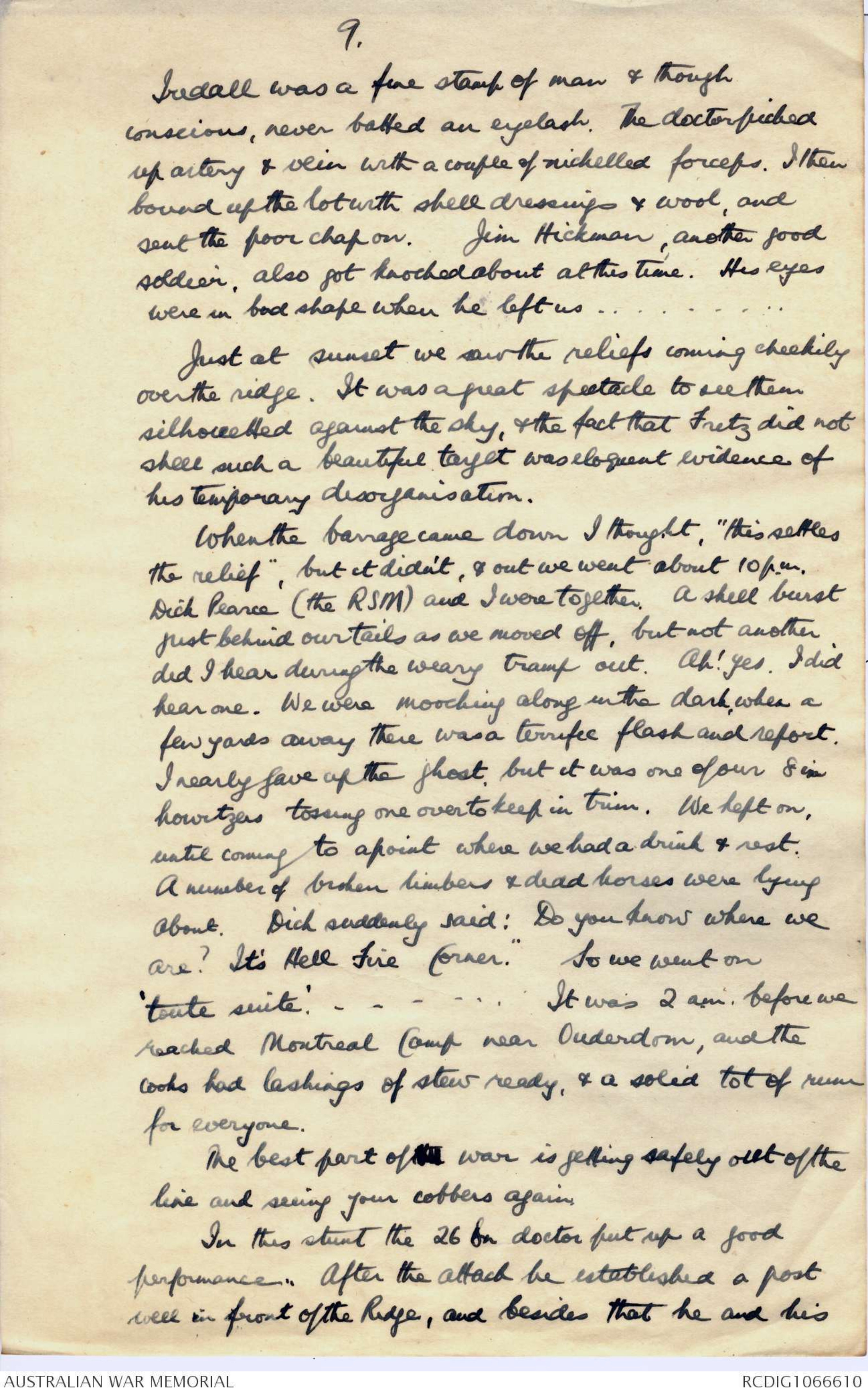
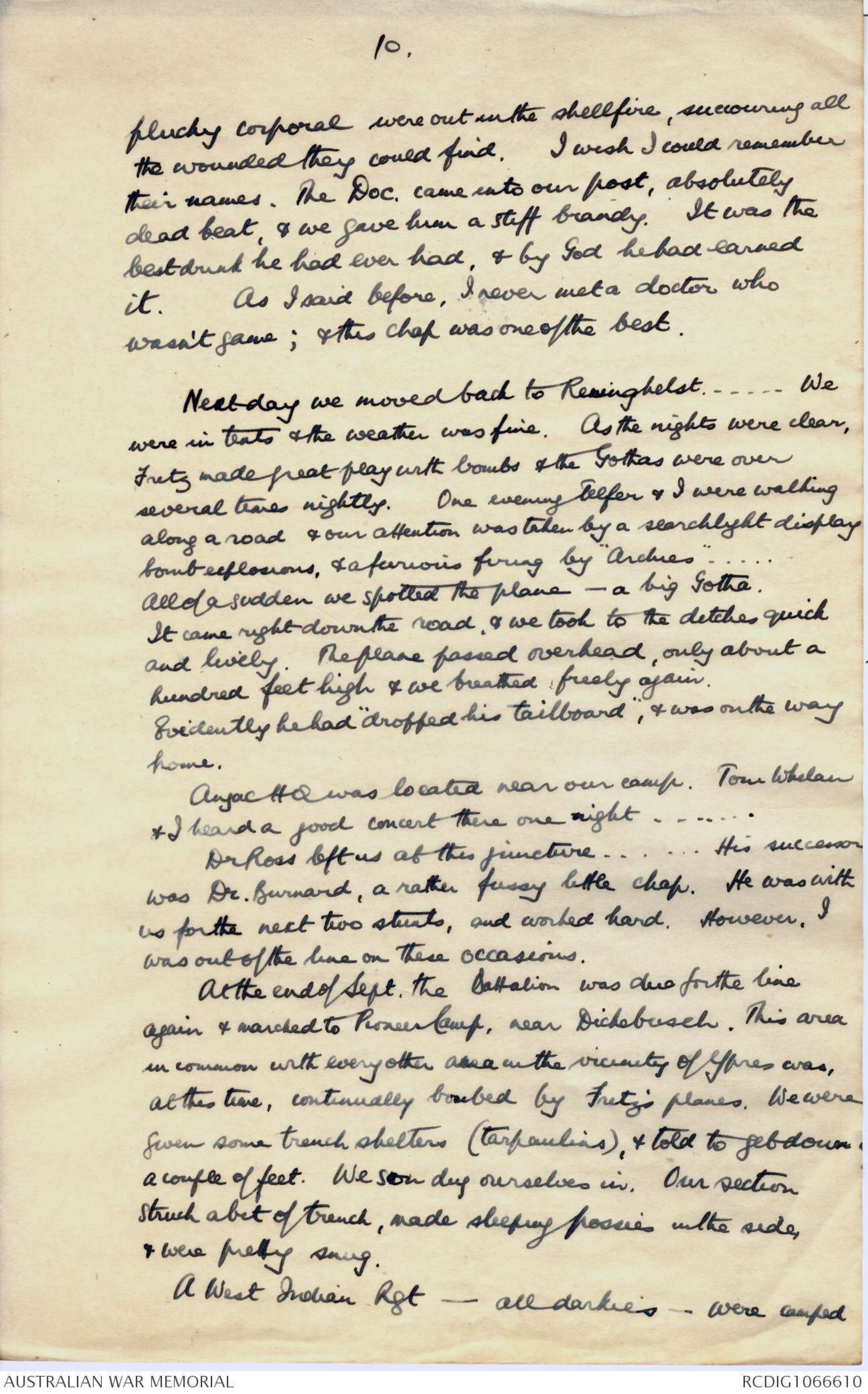
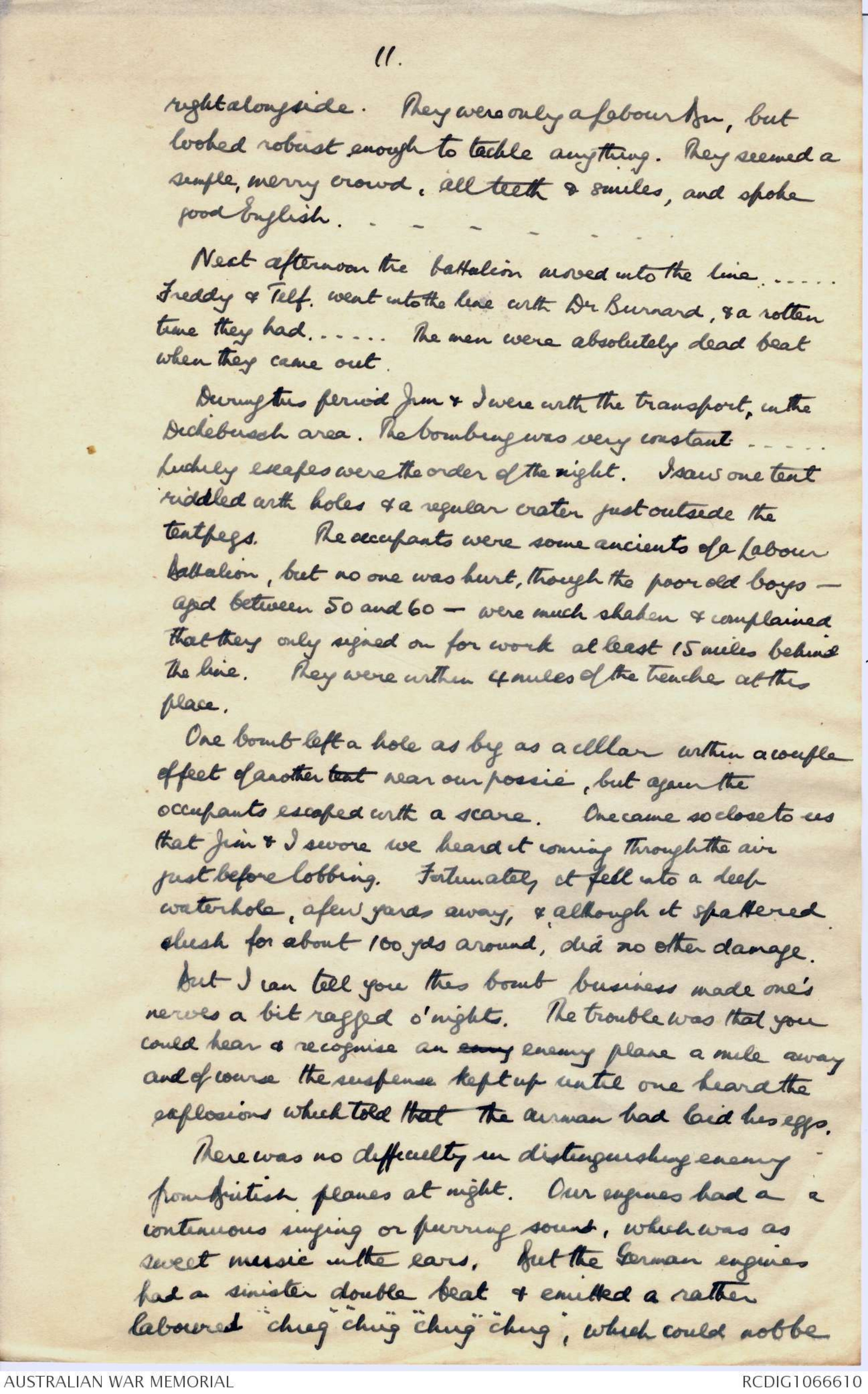
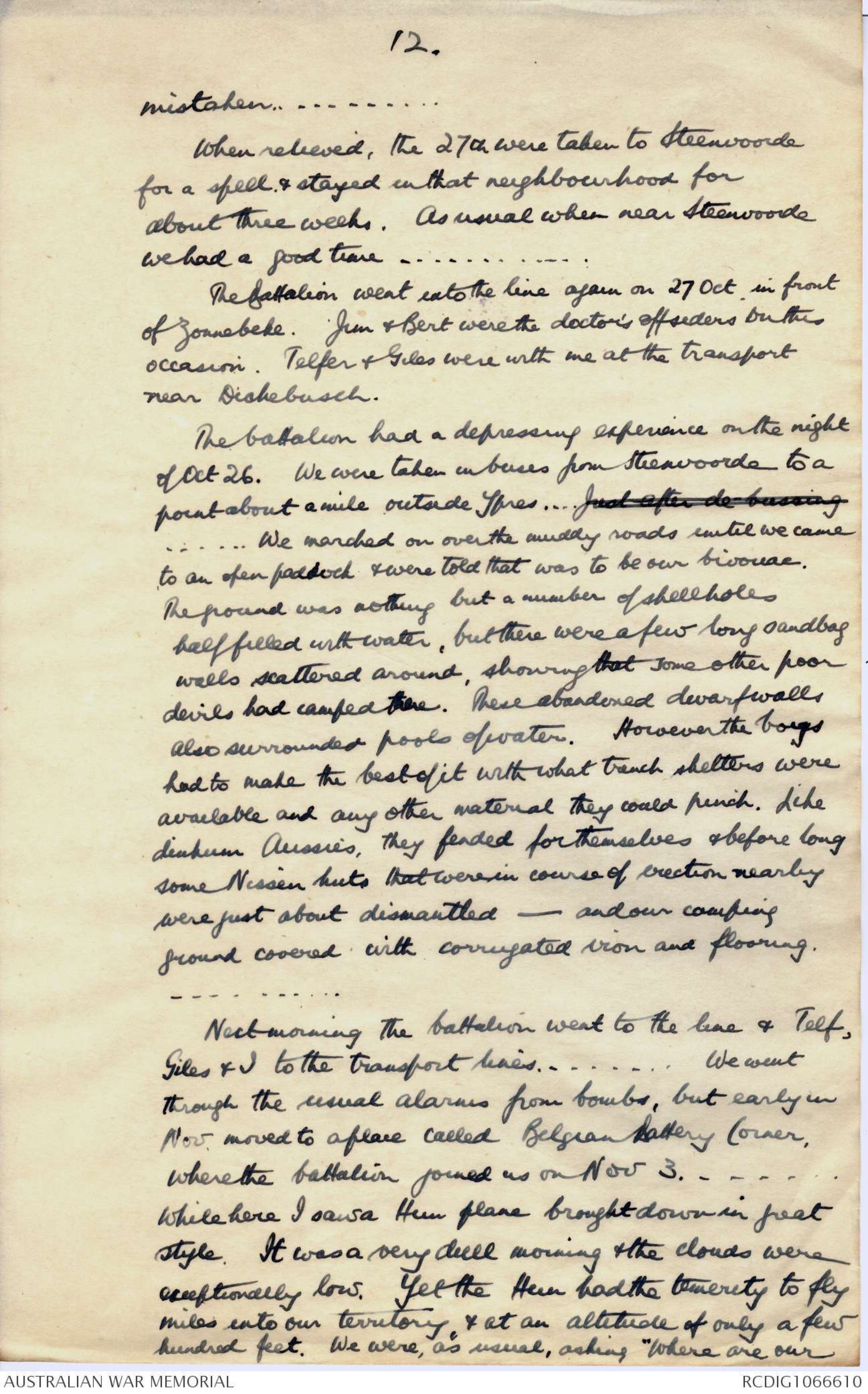
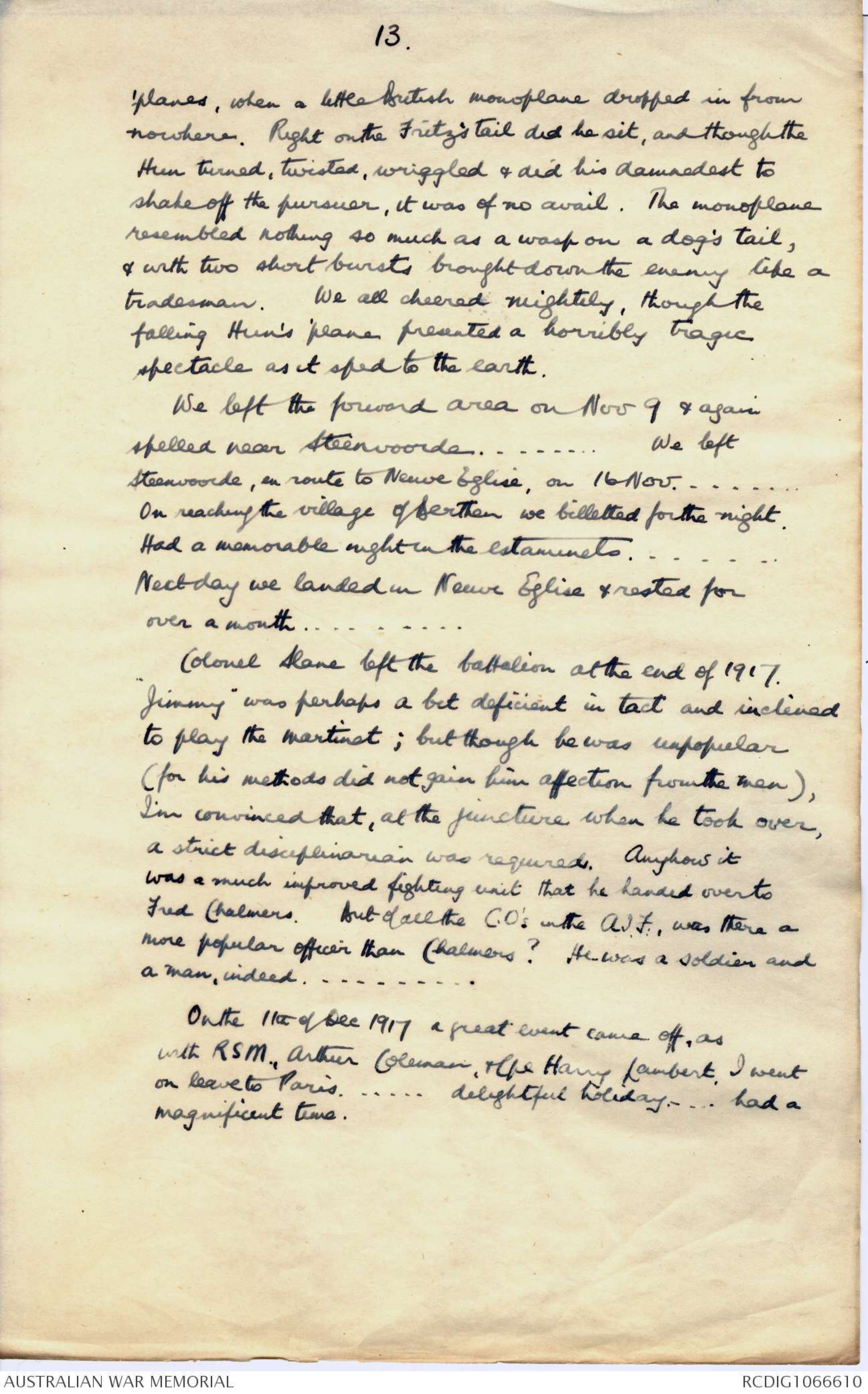
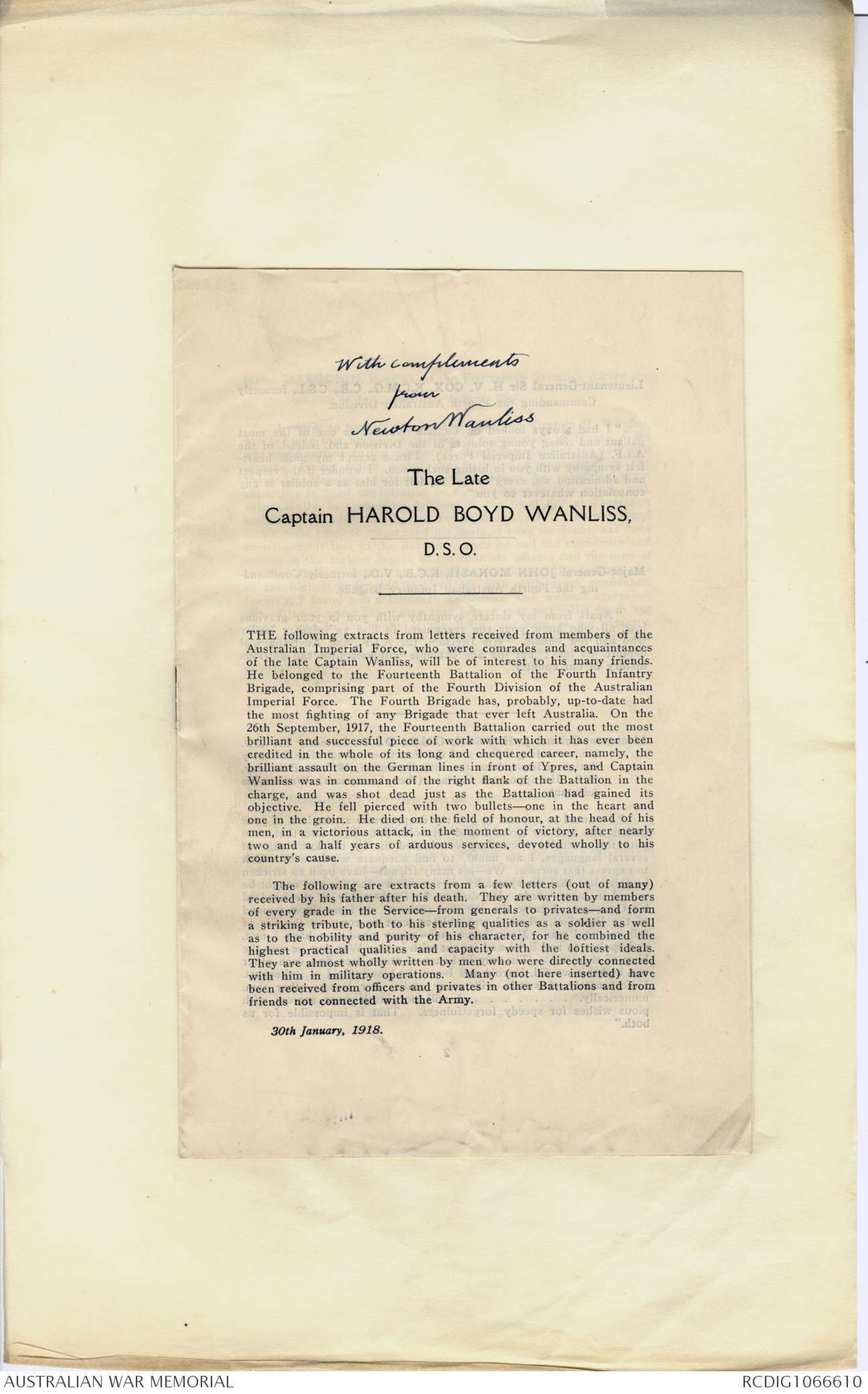
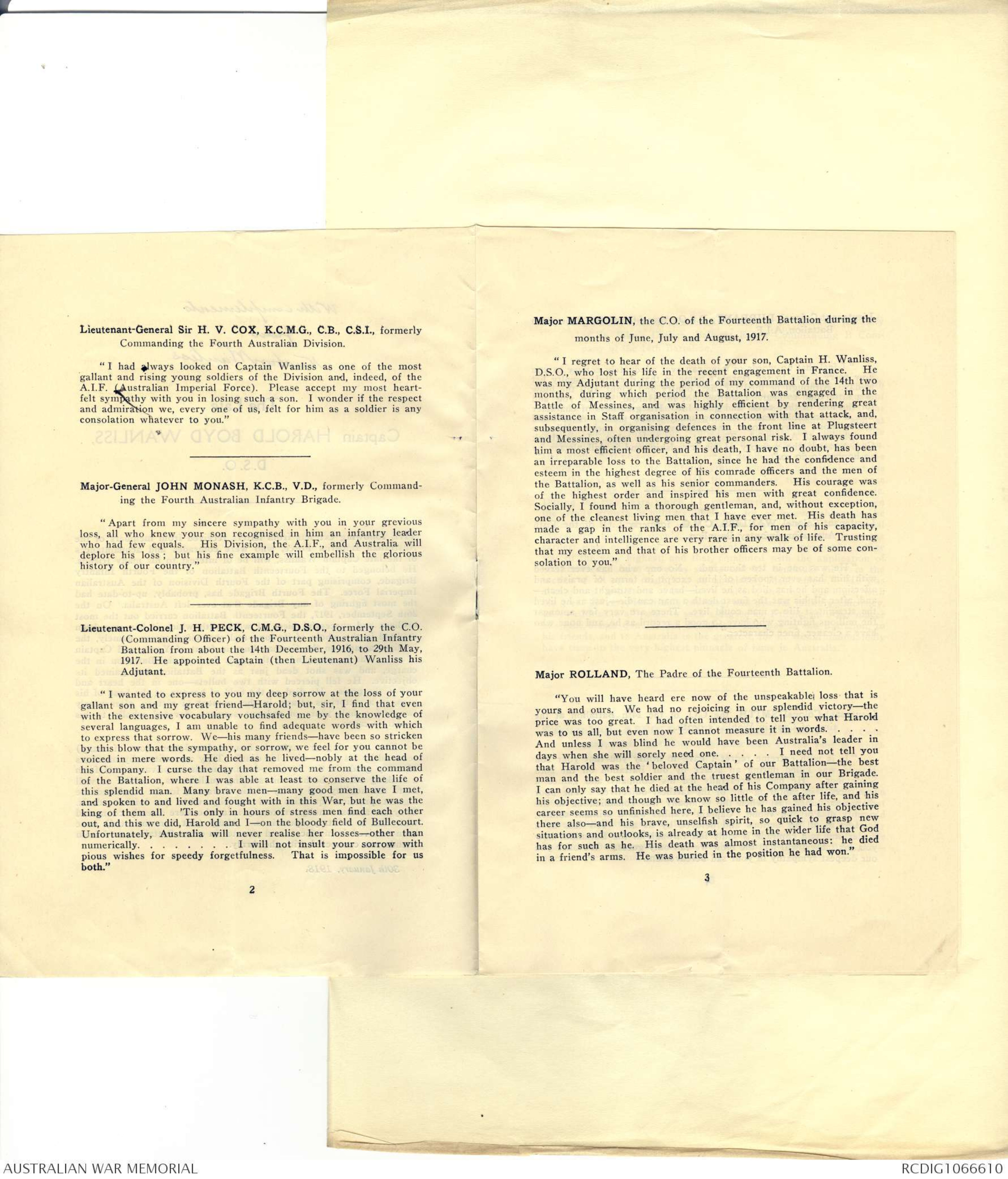
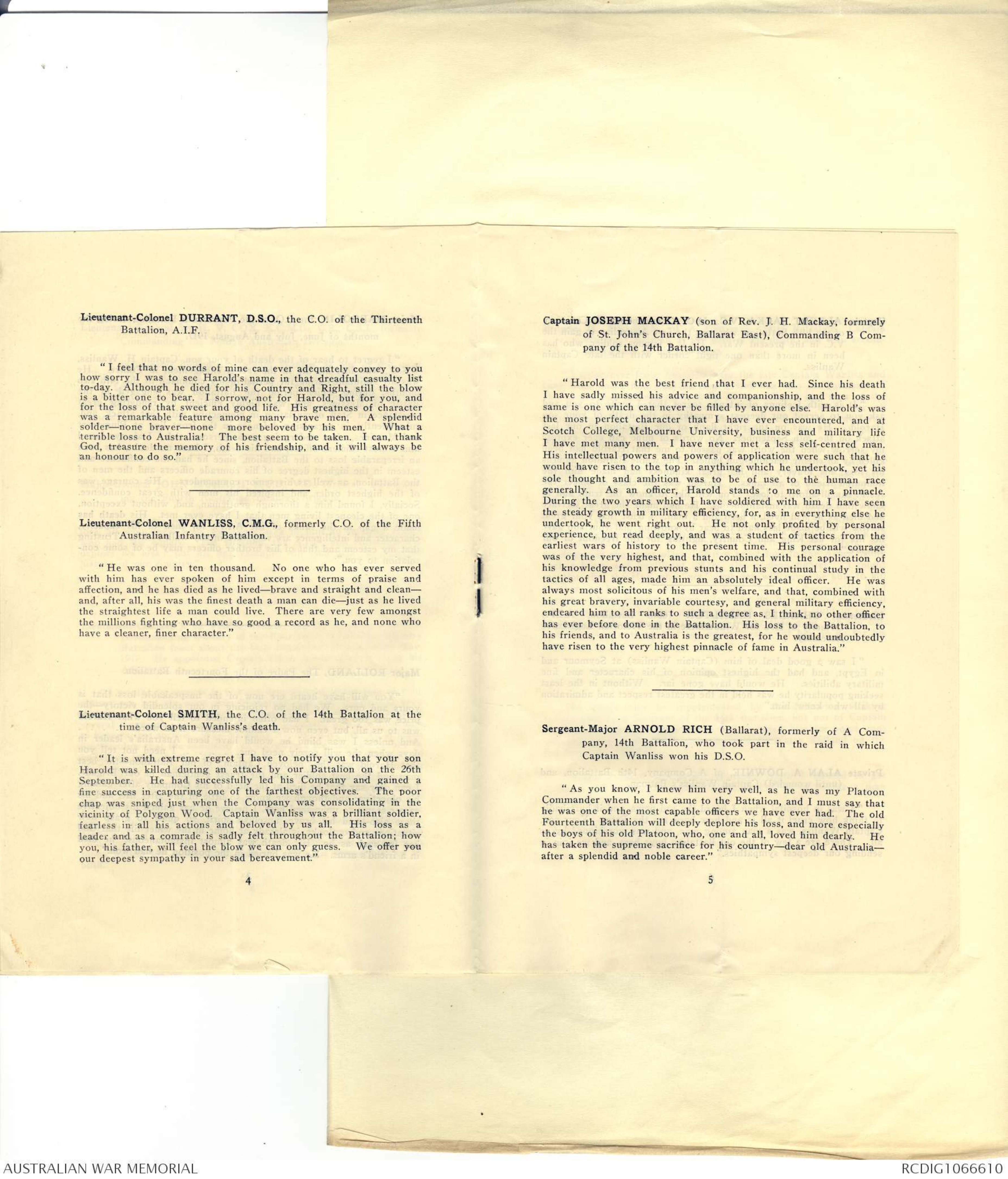
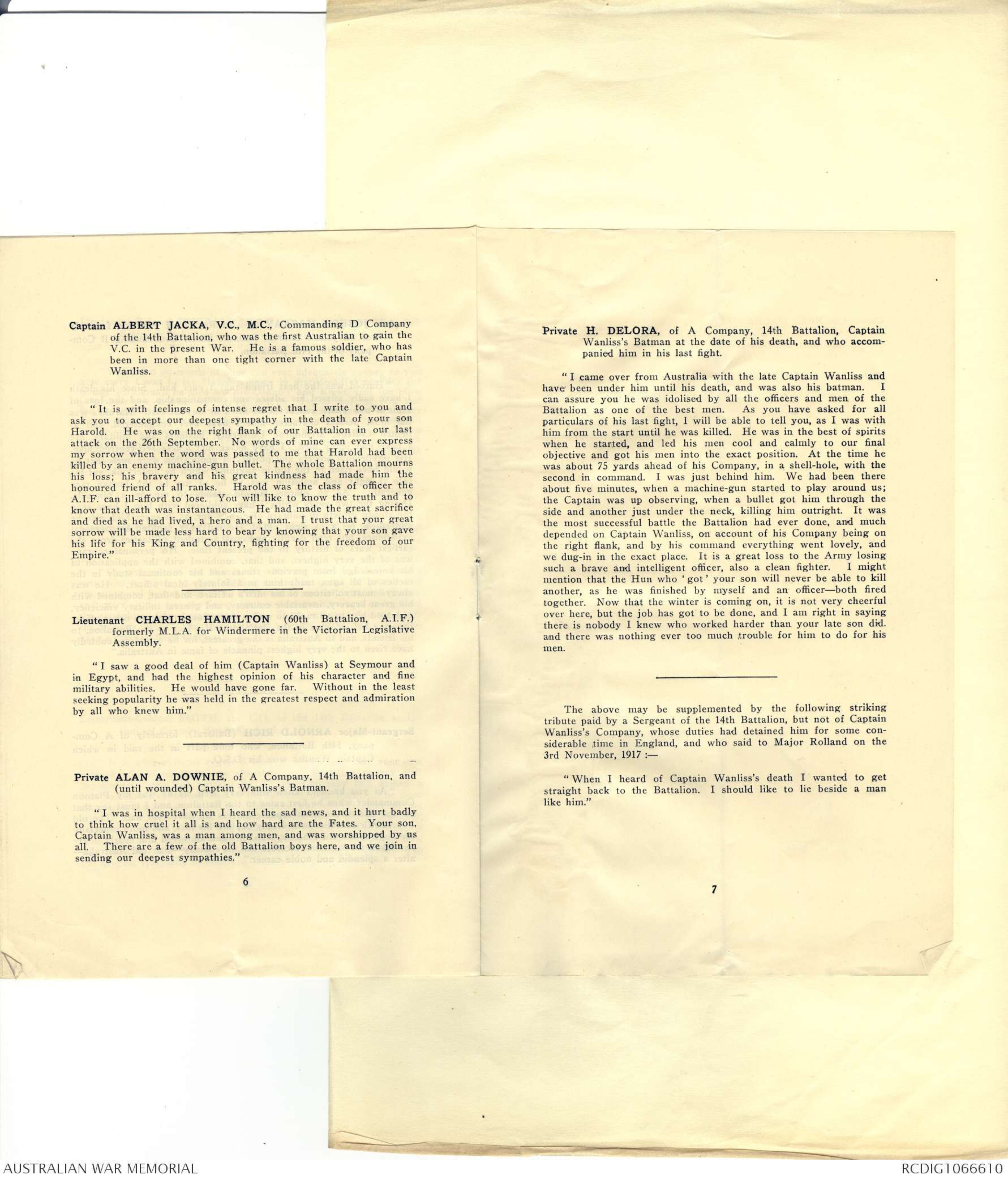
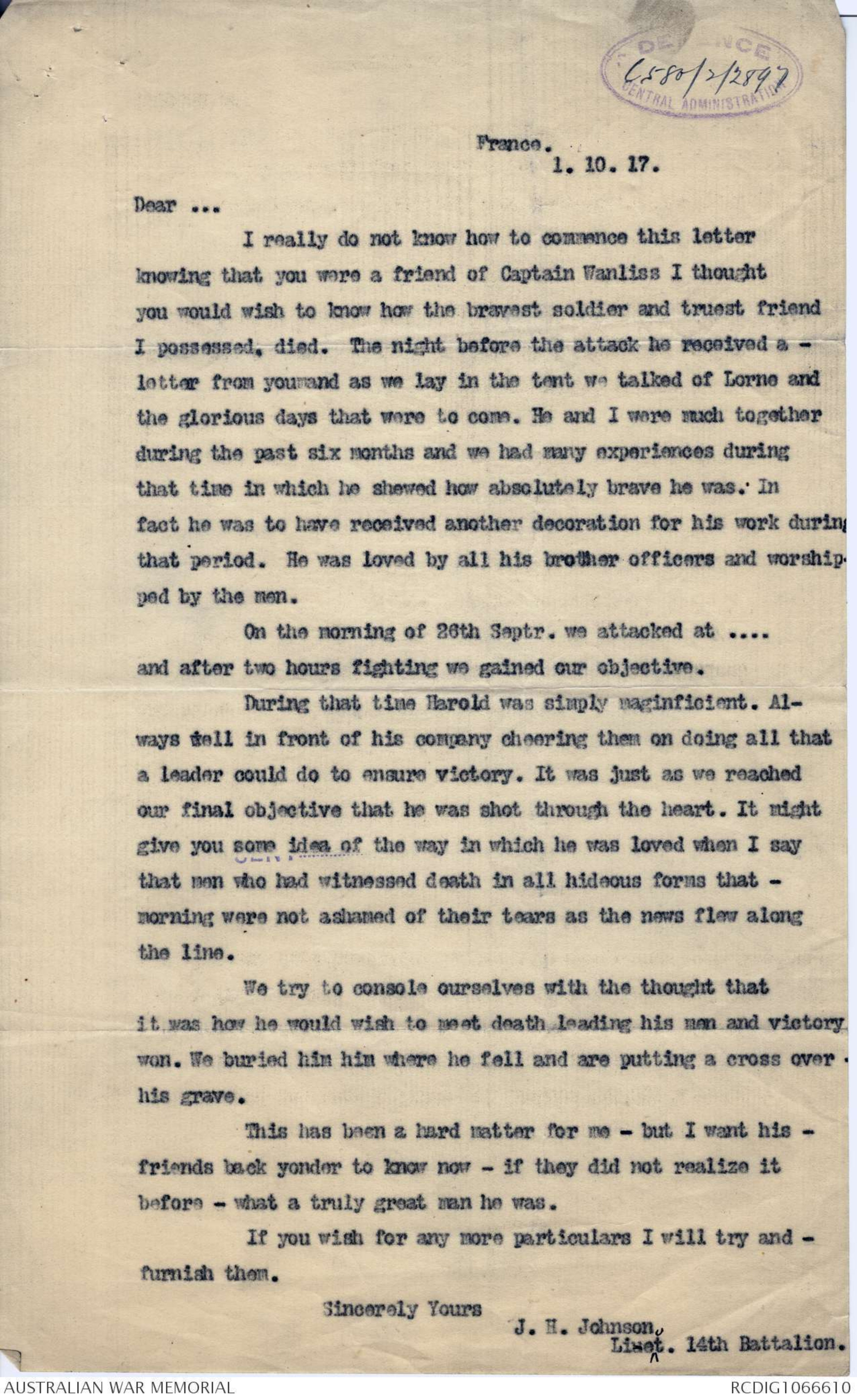
[Transcriber note from DLawson, please delete before submitting for review.
On page 5, second last paragraph starts off with "Colonel Heane/Hane", Heane is probably the correct spelling but it appears to be misspelled to my eyes. Will leave to the judgement of someone with more experience.
Did a proofread of the prior work, added the missing text on page 9, and corrected the paragraph structures, hopefully it should be close to done. Cheers.]
9.
Iredale was a fine stamp of man & though
conscious, never batted an eyelash. The doctor picked
up artery & vein with a couple of nickelled forceps. I then
bound up the lot with shell dressings & wool, and
sent the poor chap on. Jim Hickman, another good
soldier, also got knocked about at this time. His eyes
were in bad shape when he left us . . . . . . . . .
Just at sunset we saw the reliefs coming cheekily
over the ridge. It was a great spectacle to see them
silhouetted against the sky, & the fact that Fritz did not
shell such a beautiful target was eloquent evidence of
his temporary disorganisation.
When the barrage came down I thought, "this settles
the relief", but it didn't, & out we went about 10 p.m.
Dick Pearce (the RSM) and I were together. A shell burst
just behind our tails as we moved off, but not another
did I hear during the weary tramp out. Ah! yes. I did
hear one. We were mooching along in the dark, when a
few yards away there was a terrific flash and report.
I nearly gave up the ghost, but it was one of our 8 in
howitzers tossing one over to keep in trim. We kept on,
until coming to a point where we had a drink & rest.
A number of broken limbers & dead horses were lying
about. Dick suddenly said: Do you know where we
are? It's Hell Fire Corner." So we went on
'toute suite.' - - - - - It was a 2 a.m. before we
reached Montreal Camp near Ouderdom, and the
cooks had lashings of stew ready, & a solid tot of rum
for everyone.
The best part of the war is getting safely out of the
line and seeing your cobbers again.
In this stunt the 26 Bn doctor put up a good
performance. After the attack he established a post
well in front of the Ridge, and besides that he and his
10.
plucky corporal were out in the shellfire, succouring all
the wounded they could find. I wish I could remember
their names. The Doc. came into our post, absolutely
dead beat, & we gave him a stiff brandy. It was the
best drink he had ever had, & by God he had earned
it. As I said before, I never met a doctor who
wasn't game; & this chap was one of the best.
Next day we moved back to Reminghelst - We
were in tents & the weather was fine. As the nights were clear,
Fritz made great play with bombs & the Gothas were over
several times nightly. One evening Telfer & I were walking
along a road & our attention was taken by a searchlight display
bomb explosions, & a furious firing by "Archies" -----
All of a sudden we spotted the plane - a big Gotha.
It came right down the road & we took to the ditches quick
and lively. The plane passed overhead, only about a
hundred feet high & we breathed freely again.
Evidently he had "dropped his tailboard", & was on the way
home.
Anzac HQ was located near our camp. Tom Whelan
& I heard a good concert there one night ------
Dr Ross left us at this juncture --- His successor
was Dr. Burnard, a rather fussy little chap. He was with
us for the next two stunts, and worked hard. However, I
was out of the line on these occasions.
At the end of Sept. the Battalion was due for the line
again & marched to Pioneer Camp, near Dickebusch. This area
in common with every other area in the vicinity of Ypres was,
at this time, continually bombed by Fritz's planes. We were
given some trench shelters ( tarpaulins), & told to get down
a couple of feet. We soon dug ourselves in. Our section
struck a bit of trench, made sleeping possies in the side,
& were pretty snug.
A West Indian Rgt — all darkies — were camped
11
right alongside. They were only a Labour Bn, but
looked robust enough to tackle anything. They seemed a
simple, merry crowd. all teeth & smiles, and spoke
good English - - - - -
Next afternoon the battalion moved into the line . . . . .
Freddy and Telf. went into the line with Dr Burnard, & a rotten
time they had. . . . . . the men were absolutely dead beat
when they came out.
During this period Jim and I were with the transport, in the
Dickebusch area. The bombing was very constant . . . . .
Luckily escapes were the order of the night. I saw one tent
riddled with holes & a regular crater just outside the
tentpegs. The occupants were some ancients of a Labour
Battalion, but no one was hurt, though the poor old boys -
aged between 50 and 60 - were much shaken & complained
that they only signed on for work at least 15 miles behind
the line. They were within 4 miles of the trenches at this
place.
One bomb left a hole as big as a cellar within a couple
of feet of another tent near our possie, but again the
occupants escaped with a scare. One came so close to us
that Jim & I swore we heard it coming through the air
just before lobbing. Fortunately it fell into a deep
waterhole, a few yards away, & although it spattered
slush for about 100 yds around, did no other damage.
But I can tell you this bomb business made one's
nerves a bit ragged o'nights. The trouble was that you
could hear & recognise an eny enemy plane a mile away
and of course the suspense kept up until one heard the
explosions which told that the airman had laid his eggs,
There was no difficulty in distinguishing enemy
from British planes at night. Our engines had a
continuous singing or purring sound, which was as
sweet music in the ears, but the German engines
had a sinister double beat & emitted a rather
laboured "chug" "chug" "chug" "chug", which could not be
12.
mistaken. . . . . . . . . .
When relieved, the 27th were taken to Steenvoorde
for a spell & stayed in that neighbourhood for
about three weeks. As usual when near Steenvoorde
we had a good time . . . . . . . . . . . .
The Battalion went into the line again on 27 Oct, in front
of Zonnebeke. Jim & Bert were the doctor's offsiders on this
occasion. Telfer & Giles were with me at the transport
near Dickebusch.
The battalion had a depressing experience on the night
of Oct 26. We were taken in buses from Steenvoorde to a
point about a mile outside Ypres . . . . Just after de-bussing
We marched on over the muddy roads until we came
to an open paddock & were told that was to be our bivouac.
The ground was nothing but a number of shellholes
half filled with water, but there were a few long sandbag
walls scattered around, showing that some other poor
devils had camped there. These abandoned dwarf walls
also surrounded pools of water. However the boys
had to make the best of it with what trench shelters were
available and any other material they could pinch. Like
dinkum Aussies, they fended for themselves & before long
some Nissen huts that were in course of erection nearby
were just about dismantled — and our camping
ground covered with corrugated iron and flooring.
Next morning the battalion went to the line & Telf,
Giles & I to the transport lines . . . . . . We went
through the usual alarms from bombs, but early in
Nov. moved to a place called Belgian Battery Corner,
where the battalion joined us on Nov 3 . . . . . .
While here I saw a Hun plane brought down in great
style. It was a very dull morning & the clouds were
exceptionally low. Yet the Hun had the temerity to fly
miles into our territory, & at an altitude of only a few
hundred feet. We were, as usual, asking "Where are our
13.
'planes, when a little British monoplane dropped in from
nowhere. Right on the Fritz's tail did he sit, and though the
Hun turned, twisted, wriggled & did his damnedest to
shake off the pursuer, it was of no avail. The monoplane
resembled nothing so much as a wasp on a dog's tail,
& with two short bursts brought down the enemy like a
tradesman. We all cheered mightily, though the
falling Hun's 'plane presented a horribly tragic
spectacle as it sped to the earth.
We left the forward area on Nov 9 & again
spelled near Steenvoorde. . . . . We left
Steenvoorde, en route to Neuve Eglise, on 16 Nov. . .
On reaching the village of Berthen we billeted for the night.
Had a memorable night in the estaminets. . . . . . .
Next day we landed in Neuve Eglise & rested for
over a month.
Colonel [[Heane/Hane?]] left the battalion at the end of 1917.
"Jimmy" was perhaps a bit deficient in tact and inclined
to play the martinet. but though he was unpopular
(for this methods did not gain him affection from the men),
I'm convinced that, at the juncture when he took over,
a strict disciplinarian was required. Anyhow it
was a much improved fighting unit that he handed over to
Fred Chalmers. But of all the C.O's in the A.I.F., was there a
more popular officer than Chalmers? He was a soldier and
a man, indeed, . . . . . . . .
On the 11th of Dec 1917 a great event came off, as
with RSM., Arthur Coleman, & Cpl Harry Lambert, I went
on leave to Paris. . . . . . . delightful holiday. . . . had a
magnificent time.
With compliments
from
Newton Wanliss
The Late
Captain HAROLD BOYD WANLISS
D.S.O.
The following extracts from letters received from members of the
Australian Imperial Force, who were comrades and acquaintances
of the late Captain Wanliss, will be of interest to his many friends,
He belonged to the Fourteenth Battalion of the Fourth Infantry
Brigade, comprising part of the Fourth Division of the Australian
Imperial force. The Fourth Brigade has, probably, up-to-date had
the most fighting of any Brigade that ever left Australia. On the
26th September, 1917, the Fourteenth Battalion carries out the most
brilliant and successful piece of work with which it has ever been
credited in the whole of its long and chequered career, namely, the
brilliant assault on the German lines in front of Ypres, and Captain
Wanliss was in command of the right flank of the Battalion in the
charge, and was shot dead just as the Battalion had gained its
objective. He fell pierced with two bullets - one in the heart and
one in the groin. He died on the field of honour, at the head of his
men, in a victorious attack, in the moment of victory, after nearly
two and a half years of arduous services, devoted wholly to his
country's cause.
The following are extracts from a few letters (out of many)
received by his father after his death. They are written by members
of every grade in the Service - from generals to privates - and form
a striking tribute, both to his sterling qualities as a soldier as well
as to the nobility and purity of his character, for he combined the
highest practical qualities and capacity with the loftiest ideals.
They are almost wholly written by men who were directly connected
with him in military operations. Many ( not here inserted) have
been received from officers and privates in other Battalions and from
friends not connected with the Army.
30th January, 1918.
Lieutenant-General Sir H. V. COX, K.C.M.G., C.B., C.S.I., formerly
Commanding the Fourth Australian Division.
"I had always looked on Captain Wanliss as one of the most
gallant and rising young soldiers of the Division and, indeed, of the
A.I.F. (Australian Imperial Force). Please accept my most heartfelt
sympathy with you in losing such a son. I wonder if the respect
and admiration we, everyone of us, felt for him as a soldier is any
consolation whatever to you."
Major-General JOHN MONASH, K.C.B., V.D., formerly Commanding
the Fourth Australian Infantry Brigade.
" Apart from my sincere sympathy with you in your grevious
loss, all who knew your son recognised in him an infantry leader
who had few equals. His Division, the A.I.F., and Australia will
deplore his loss; but his fine example will embellish the glorious
history of our country."
__________________________
Lieutenant-Colonel J. H. PECK, C.M.G., D.S.O., formerly the C.O.
(Commanding Officer) of the Fourteenth Australian Infantry
Battalion from about the 14th December, 1916, to 29th May,
1917. He appointed Captain ( then Lieutenant) Wanliss his
Adjutant.
" I wanted to express to you my deep sorrow at the loss of your
gallant son and my great friend - Harold; but sir, I find that even
with the extensive vocabulary vouchsafed me by the knowledge of
several language, I am unable to find adequate words with which
to express sorrow. We - his many friends - have been so stricken
by this blow that the sympathy, or sorrow, we feel for you cannot be
voiced in mere words. He died as he lived - nobly at the head of
his Company. I curse the day that removed me from the command
of the Battalion, where I was able at least to conserve the life of
this splendid man. Many brave men - many good men have I met,
and spoken to and lived and fought with in this War, but he was the
king of them all. 'Tis only in hours of stress men find each other
out, and this we did. Harold and I - on the bloody field of Bullecourt.
Unfortunately, Australia will never realise her losses - other than
numerically. . . . . . . . . I will not insult your sorrow with
pious wishes for speedy forgetfulness. That is impossible for us
both."
2
Major MARGOLIN, the C. O. Of the Fourteenth Battalion during the
months of June, July and August, 1917.
”I regret to hear of the death of your son, Captain H. Wanliss,
D.S.O. Who lost his life in the recent engagement in France. He
was my Adjutant during the period of my command of the 14th, two
months during which period the Battalion was engaged in the
Battle of Messines, and was highly efficient by rendering great
assistance in Staff organisation in connection with the attack, and,
subsequently in organising defences in the front line at Plugsteert
and Messines, often undergoing great personal risk. I have no doubt, has been
an irreparable loss to the Battalion, since he had the confidence and
esteem in the highest degree of his comrade officers and the men of
the Battalion, as well as his senior commanders. His courage was
of the highest order and inspired his men with great confidence.
Socially, I found him a thorough gentlemen, and, without exception,
one of the cleanest living men that I have ever met. His death has
made a gap in the ranks of the A.I.F., for men of his capacity,
character and intelligence are very rare in any walk of life. Trusting
that my esteem and that of his brother officers may be of some consolation
to you”.
Major Rolland, The Padre of the Fourteenth Battalion.
" You will have heard ere now of the unspeakable loss that is
yours and ours. We had no rejoicing in our splendid victory—the
price was too great. I had often intended to tell you what Harold
was to us all, but even now I cannot measure it in words . . .
And unless I was blind he would have been Australia's leader in
days when she will sorely need one. . . . . . I need not tell you
that Harold was the 'beloved Captain' of our Battalion - the best
man and best soldier and the truest gentleman in our Brigade.
I can only say that he died at the head of his Company after gaining
his objective; and though we know so little of the after life, and his
career seems so unfinished here, I believe he has gained his objective
there also—and his brave, unselfish spirit, so quick to grasp new
situations and outlooks, is already at home in the wider life that God
has for such as he. His death was almost instantaneous: he died
in a friend's arms. He was buried in the position he had won. "
3
Lieutenant-Colonel DURRANT, D.S.O., the C.O. of the Thirteenth
Battalion , A.I.F.
" I feel that no words of mine can ever adequately convey to you
how sorry I was to see Harold's name in that dreadful casualty list
to-day. Although he died for his Country and Right, still the blow
is a bitter one to bear. I sorrow, not for Harold, but for you, and
for the loss of that sweet and good life. His greatness of character
was a remarkable feature among many brave men. A splendid
solder—none braver—none more beloved by his men. What a
terrible loss to Australia! The best seem to be taken. I can, thank
God, treasure the memory of his friendship, and it will always be
an honour to do so."
_____________________________
Lieutenant-Colonel WANLISS, C.M.G., formerly C.O. of the Fifth
Australian Infantry Battalion.
" He was one in ten thousand. No one who has ever served
with him has ever spoken of him except in terms of praise and
affection, and he has died as he lived—brave and straight and clean—
and, after all, his was the finest death a man can die—just as he lived
the straightest life a man could live. There are very few amongst
the millions fighting who have so good a record as he, and none who
have a cleaner, finer character."
Lieutenant-Colonel SMITH, the C.O. of the 14th Battalion, at the
time of Captain Wanliss's death.
" It is with extreme regret I have to notify you that your son
Harold was killed during an attack by our Battalion on the 26th
September. He had successfully led his Company and gained a
fine success in capturing one of the farthest objectives. The poor
chap was sniped just when the Company was consolidating in the
vicinity of Polygon Wood. Captain Wanliss was a brilliant soldier,
fearless in all his actions and beloved by us all. His loss as a
leader and as a comrade is sadly felt throughout the Battalion; how
you, his father, will feel the blow we can only guess. We offer you
our deepest sympathy in your sad bereavement."
4
Captain JOSEPH MACKAY (son of Rev. J. H. Mackay, formrely
of St John's Church, Ballarat East), Commanding B Company
of the 14th Battalion.
" Harold was the best friend that I ever had. Since his death
I have sadly missed his advice and companionship, and the loss of
same is one which can never be filled by anyone else. Harold's was
the most perfect character that I have ever encountered, and at
Scotch College, Melbourne University, business and military life
I have met many men. I have never met a less self-centred man.
His intellectual powers and powers of application were such that he
would have risen to the top of anything which he undertook, yet his
sole thought and ambition was to be of use to the human race
generally. As an officer, Harold stands to me on a pinnacle.
During the two years which I have soldiered with him I have seen
the steady growth in military efficiency, for, as in everything else he
undertook, he went right out. He not only profited by personal
experience, but read deeply, and was a student of tactics from the
earliest wars of history to the present time. His personal courage
was of the very highest, and that, combined with the application of
his knowledge from previous stunts and his continual study in the
tactics of all ages, made him an absolutely ideal officer. He was
always most solicitous of his men's welfare, and that, combined with
his great bravery, invariable courtesy, and general military efficiency,
endeared him to all ranks to such a degree as, I think, no other officer
has ever before done in the Battalion. His loss to the Battalion, to
his friends, and to Australia is the greatest, for he would undoubtedly
have risen to the very highest pinnacle of fame in Australia."
Sergeant-Major ARNOLD RICH (Ballarat), formerly of A Company,
14th Battalion, who took part in the raid in which
Captain Wanliss won is D.S.O.
" As you know, I knew him very well, as he was my Platoon
Commander when he first came to the Battalion, and I must say that
he was one of the most capable officers we have ever had. The old
Fourteenth Battalion will deeply deplore his loss, and more especially
the boys of his old Platoon, who, one and all, loved him dearly. He
has taken the supreme sacrifice for his country—dear old Australia—
after a splendid and noble career."
5
Captain ALBERT JACKA, V.C., M.C., Commanding D Company
of the 14th Battalion who was the first Australian to gain the
V.C. in the present War. He is a famous soldier, who has
been in more than one tight corner with the late Captain
Wanliss.
" It is with feelings of intense regret that I write to you and
ask you to accept our deepest sympathy in the death of your son
Harold. He was on the right flank of our Battalion in our last
attack on the 26th September. No words of mine can ever express
my sorrow when the word passed to me that Harold had been
killed by an enemy machine-gun bullet. The whole Battalion mourns
his loss; his bravery and his great kindness had made him the
honoured friend of all ranks. Harold was the class of officer the
A.I.F. can ill-afford to lose. You will like to know the truth and to
know that death was instantaneous. He had made the great sacrifice
and died as had lived, a hero and a man. I trust that your great
sorrow will be made less hard to bear knowing that your son gave
his life for his King and Country, fighting for the freedom of our
Empire."
_____________________________
Lieutenant CHARLES HAMILTON (60th Battalion, A.I.F.)
formerly M.L.A. for Windermere in the Victorian Legislative
Assembly.
"I saw a good deal of him (Captain Wanliss) at Seymour and
in Egypt, and had the highest opinion of his character and fine
military abilities. He would have gone far. Without in the least
seeking popularity he was held in the greatest respect and admiration
by all who knew him."
Private ALAN A. DOWNIE, of A Company, 14th Battalion, and
(until wounded) Captain Wanliss's Batman.
" I was in hospital when I heard the sad news, and it hurt badly
to think how cruel it all is and how hard are the Fates. Your son,
Captain Wanliss, was a man among men, and was worshipped by us
all. There are a few of the old Battalion boys here, and we join in
sending our deepest sympathies."
6
Private H. DELORA, of A Company, 14th Battalion, Captain
Wanliss's Batman at the date of his death, an who accompanied
him in his last fight.
" I came over from Australia with the late Captain Wanliss and
have been under him until his death, and was also his batman. I
can assure you he was idolised by all the officers and men of the
Battalion as one of the best men. As you have asked for all
particulars of his last fight, I will be able to tell you, as I was with
him from the start until he was killed. He was in the best of spirits
when he started, and led his men cool and calmly to our final
objective and got his men into the exact position. At the time he
was about 75 yards ahead of his Company, in a shell-hole, with the
second in command. I was just behind him. We had been there
about five minutes, when a machine-gun started to play around us;
the Captain was up observing, when a bullet got him through the
side and another just under the neck, killing him outright. It was
the most successful battle the Battalion had ever done, and much
depended on Captain Wanliss, on account of his Company being on
the right flank, and by his command everything went lovely, and
we dug-in in the exact place. It is a great loss to the Army losing
such a brave and intelligent officer, also a clean fighter. I might
mention that the Hun who 'got' your son will never be able to kill
another, as he was finished by myself and an officer—both fired
together. Now that the winter is coming on, it is not very cheerful
over here, but the job has got to be done, and I am right in saying
there is nobody I knew who worked harder than your late son did.
and there was nothing ever too much trouble for him to do for his
men.
The above may be supplemented by the following striking
tribute paid by a Sergeant of the 14th Battalion, but not of Captain
Wanliss's Company, whose duties had detained him for some considerable
time in England, and who said to Major Rolland on the
3rd November, 1917 :—
" When I head of Captain Wanliss's death I wanted to get
straight back to the Battalion. I should like to lie beside a man
like him."
7
DEFENCE
C580/2/2897
CENTRAL ADMINISTRATION
France.
1. 10. 17
Dear ...
I really do not know how to commence this letter
knowing that you were a friend of Captain Wanliss I thought
you would wish to know how the bravest soldier and truest friend
I possessed, died. The night before the attack he received a -
letter from you and as we lay in the tent we talked of Lorne and
the glorious days that were to come. He and I were much together
during the past six months and we had many experiences during
that time in which he shewed how absolutely brave he was. In
fact he was to have received another decoration for his work during
that period. He was loved by all his brother officers and worshipped
by the men.
On the morning of 26th Septr. we attacked . . . .
and after two hours fighting we gained our objective.
During that time Harold was simply magnificent. Always
well on front of his company cheering them on doing all that
a leader could do to ensure victory. It was just as we reached
our final objective that he was shot through the heart. It might
give you some idea of the way in which he was loved when I say
that men who had witnessed death in all hideous forms that -
morning were not ashamed of their tears as the news flew along
the line.
We try to console ourselves with the thought that
it was how he would wish to meet death leading his men and victory
won. We buried him him where he fell and are putting a cross over
his grave.
This has been a hard matter for me - but I want his -
friends back yonder to know now - if they did not realize it
before - what a truly great man he was.
If you wish for any more particulars I will try and -
furnish them.
Sincerely Yours
J. H. Johnson
Lie^ut. 14th Battalion.
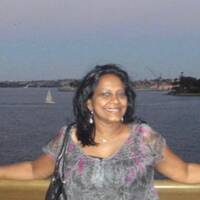 Jasmine Hatharasinghe
Jasmine HatharasingheThis transcription item is now locked to you for editing. To release the lock either Save your changes or Cancel.
This lock will be automatically released after 60 minutes of inactivity.